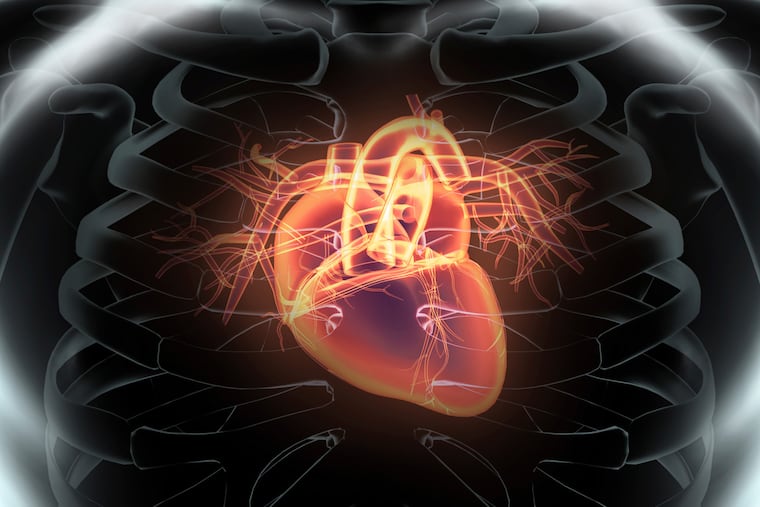The top 10 heart health developments in 2021, according to a Philly cardiologist
The number one advance in cardiology in 2021, in this doctor's opinion, has been the discovery that medications once used for diabetes are now being used for other conditions that help the heart.

A lot has happened in the world of cardiology in 2021. Here are my top 10 developments in the field.
10. New cholesterol medications. Inclisiran, sold under the brand name Leqvio, was approved by the FDA in December. It lowers cholesterol, but needs to be given only as a twice-a-year injection. Right now, it is approved for familial hypercholesterolemia, a genetic cause of high cholesterol. Inclisiran is a unique type of PCKS9 inhibitor that reduces LDL cholesterol by about 50% to 60%. A trial is ongoing to investigate the effects of inclisiran on major adverse cardiovascular events.
9. Stroke prevention. In atrial fibrillation, blood clots often occur in the left atrial appendage. This is a small area attached to the left atrium. When a patient is undergoing cardiac surgery for other reasons, if the atrial appendage was occluded, usually by amputation and closure, the risk of stroke from a blood clot went down to 4.8% from 7%.
8. Fish oil in higher doses may be harmful. Several analyses have shown a higher risk of developing atrial fibrillation when taking high doses (greater than 1 gram daily) of fish oil. Yet, in patients with multiple cardiac risk factors who are already on a statin, the higher doses of Vascepa, a prescription brand of omega 3 fatty acid (at 2 grams twice per day), has been shown to decrease the risk of a cardiac event by up to 30%.
7. TAVR was shown to be effective and safe for younger, lower-risk patients. Before this, the use of transcatheter aortic valve replacement had been restricted to the elderly. This technique has allowed many people to avoid open-heart surgery.
6. MRI may be used to scan the heart. A new technique to quickly scan the heart was developed this year. Three-dimensional (3D) ultrafast cardiac magnetic resonance to diagnose heart disease with a single breath-hold is still in clinical trials, but exciting for the future.
5. Aspirin may be overused in cardiac prevention. Taking a daily aspirin may not be needed if you have no history of heart attack, bypass, stenting or a stroke. If you are still taking it and do not have one of these conditions, check with your doctor.
4. New guidance for hypertension. The AHA/ACC released a scientific statement offering new guidance for the treatment of stage 1 hypertension among patients with low ASCVD risk. Among low-risk adults with stage 1 hypertension (blood pressure 130-139/80-89 mmHg), management starts with nonpharmacologic therapy such as salt restriction, decreased alcohol, weight loss and exercise. If blood pressure remains uncontrolled at three to six months, the new suggestion is to consider starting pharmacologic therapy.
3. COVID and myocarditis. One of the major concerns about the COVID-19 vaccine 1 has been an increase in the risk of myocarditis, an inflammation of the heart muscle. In a recent analysis in the British Medical Journal, this risk was found to be very low overall. The risk is slightly higher in young men who received the Moderna vaccine rather than the Pfizer, but it is not severe, and not clinically a worry, especially compared with the risks of the unvaccinated getting a severe COVID infection.
2. Lowering body temperature after cardiac arrest. If someone has an out-of-the-hospital cardiac arrest, the standard of care has been to lower the body temperature, called targeted temperature management. This is done to preserve brain function. A Swedish trial published in June showed that lowering temperature did not change mortality. This study helps point out the importance of testing therapies that have become standard to be certain that interventions make a difference.
1. Diabetes medications can improve heart health. The number-one advance in cardiology in 2021, in my opinion, has been the discovery that medications once used for diabetes are now being used for other conditions that help the heart. They are used to treat:
Heart failure. A class of diabetes medications called SGLT2 inhibitors (Jardiance, Farxiga) are oral agents that were shown to help all kinds of heart failure. It has quickly become a recommended primary treatment.
Obesity. Another diabetes medication, called a GLP-1, named semaglutide (Ozempic), is approved by the FDA for diabetes at doses up to 1 mg and is given subcutaneously once weekly. At a higher dose of 2.4 mg subcutaneously weekly, the same drug (Wegovy) — along with lifestyle changes — has been shown to cause major weight loss in overweight or obese adults. This dose, approved by the FDA in June, is very exciting because it is very well tolerated and has resulted in sustained weight loss.
David Becker is a board-certified cardiologist with Chestnut Hill Temple Cardiology in Flourtown. He has been in practice for more than 25 years.